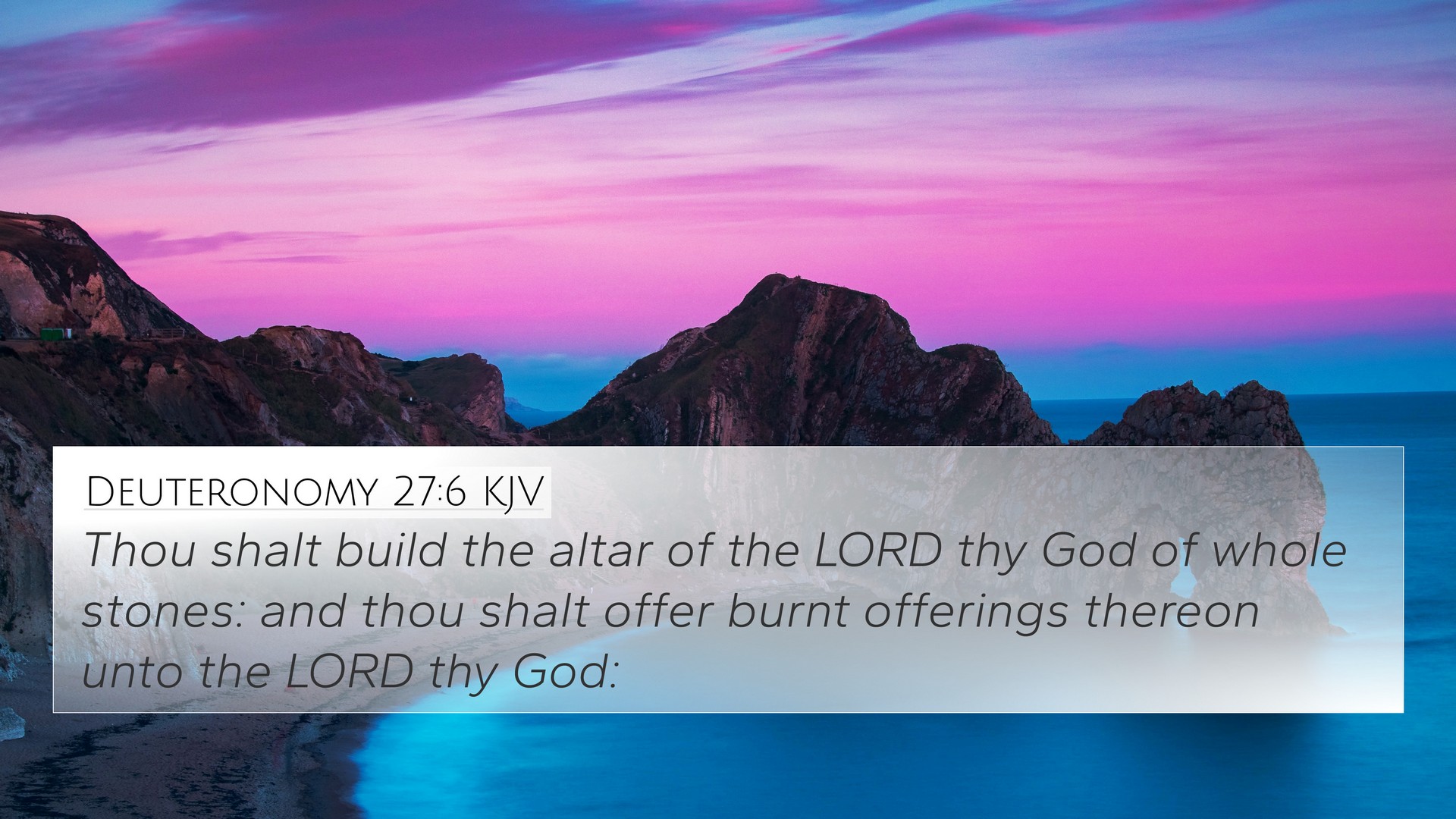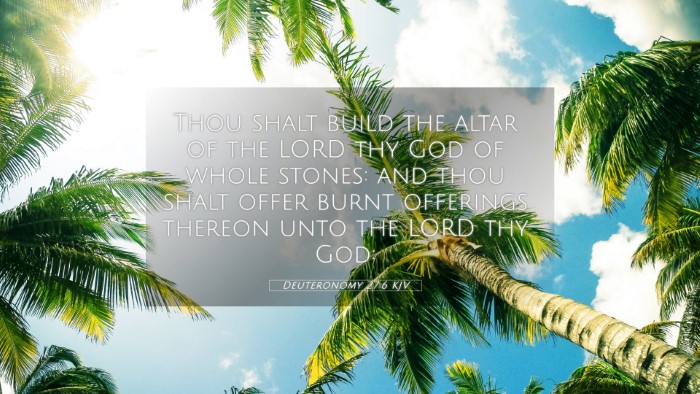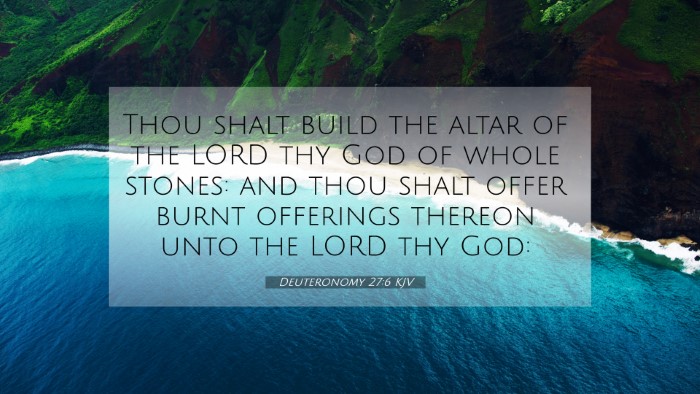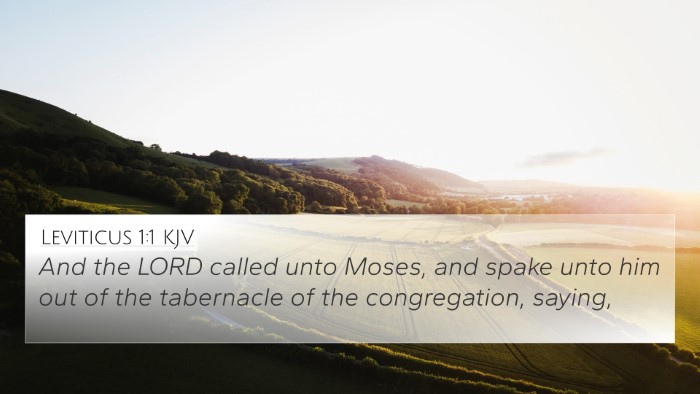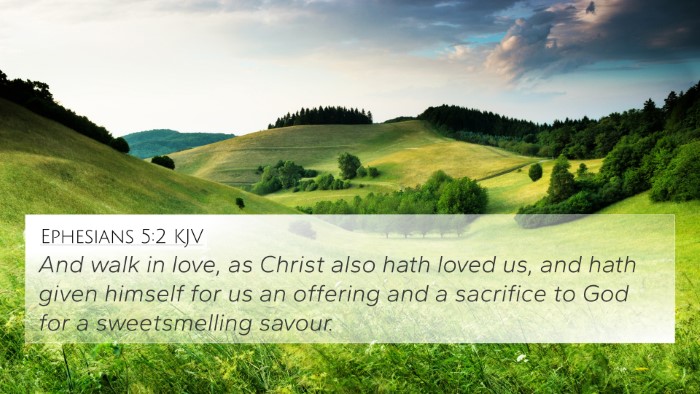Understanding Deuteronomy 27:6
Deuteronomy 27:6 states:
"Thou shalt build the altar of the Lord thy God of whole stones: and thou shalt offer burnt offerings thereon unto the Lord thy God."
Overview of Deuteronomy 27:6
This verse outlines the instruction given to the Israelites regarding the construction of an altar for worshiping the Lord. The emphasis on using "whole stones" signifies the purity and sanctity required in the offerings made to God.
Commentary Insights
Matthew Henry's Commentary
Matthew Henry emphasizes the significance of the altar as a place of worship and sacrifice. He notes that the use of whole stones symbolizes the integrity and untainted nature of the dedication to God. Henry explains that everything used in the service of God should be whole and unblemished, reflecting the best offerings to the divine.
Albert Barnes' Commentary
Albert Barnes highlights the practical aspects of building the altar using natural stones, which signifies a return to the basics of worship. He asserts that the command to not use hewn stones points to the importance of simplicity in worship practices. Barnes suggests this reinforces the idea that God desires authenticity over artistic sophistication.
Adam Clarke's Commentary
Adam Clarke provides a detailed analysis of the cultural context, mentioning that the use of whole stones is a reflection of God’s desire for integrity in worship. Clarke notes that offerings made on this altar must be sincere, capturing the essence of true devotion. He connects this directive to the broader theme of covenant loyalty found throughout Deuteronomy.
Thematic Connections
Deuteronomy 27:6 is interconnected with various themes found throughout the Bible, particularly regarding worship, holiness, and God’s requirements for offerings. Below are some cross-references related to this verse:
- Exodus 20:25: “And if thou wilt make me an altar of stone, thou shalt not build it of hewn stone...” - This emphasizes using whole stones for altars.
- Genesis 33:20: “And he erected there an altar, and called it Elelohe-Israel.” - Highlights the practice of building altars in relationship with God.
- Leviticus 1:3: “If his offering be a burnt sacrifice of the herd, let him offer a male without blemish...” - Discusses the quality of offerings required by God.
- Joshua 8:30: “Then Joshua built an altar unto the Lord God of Israel in mount Ebal...” - Further recounting the building of altars for worship.
- 1 Kings 18:31: “And Elijah took twelve stones, according to the number of the tribes of the sons of Jacob...” - The importance of stones as symbols of unity and worship.
- Hebrews 13:10: “We have an altar, whereof they have no right to eat which serve the tabernacle.” - Connecting the concept of altars across the Testaments.
- Psalm 51:17: “The sacrifices of God are a broken spirit: a broken and a contrite heart...” - Revealing God's true desire for inward purity over outward compliance.
Bible Verse Connections
Examining Deuteronomy 27:6 invites readers to explore its connections to other instances of altar-building and offerings throughout the scriptures. By employing Bible cross-referencing tools, believers can gain deeper insights into the significance of altars and God’s holiness. Below are methods and resources for enhancing your study:
Tools for Bible Cross-Referencing
- Bible Concordance: A helpful tool for locating specific themes and phrases.
- Bible Cross-Reference Guide: Contains systematic links between scriptures.
- Cross-Reference Bible Study: Methods to explore the relationships between verses more deeply.
- Bible Reference Resources: Collectives of information for at-a-glance comparisons.
- Bible Chain References: Following a series of connected verses for thematic study.
Practical Application
Understanding Deuteronomy 27:6 encourages believers to consider the quality and sincerity of their worship. It invites reflection on how we present ourselves before God and the importance of approaching Him with honesty and integrity. As seen in cross-referenced verses, the condition of our hearts is paramount in the offerings we bring to Him.
Conclusion
Deuteronomy 27:6 acts as a significant reminder of the sanctity of worship and offers rich ground for comparative Bible verse analysis. It encourages believers to delve into scripture, uncovering thematic connections that enhance one’s understanding of God's desires for worship and relationship. By using effective tools for cross-referencing and studying related scriptures, individuals can more deeply grasp the relationships between biblical texts, leading to enriched spiritual insights.
